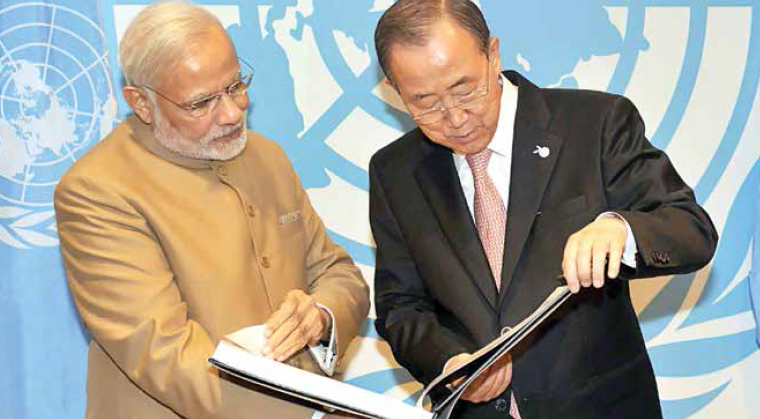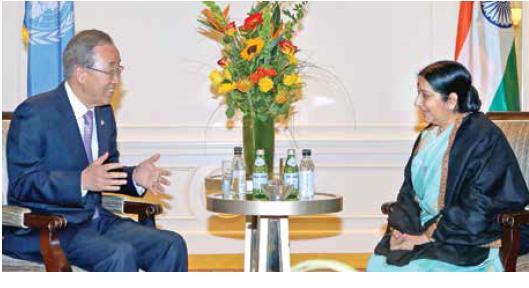India was a member of the UN even before it was an independent nation, which a rare occurrence that will never happen again. Yet it shows the significance of this ancient nation, which finally turns into a world’s leader, just as it was centuries and millennia ago
India and the UN have had fruitful cooperation even from the very beginning. India was among the original members of the United Nations that signed the Declaration by United Nations at Washington. As a founding member of the UN, India strongly supports the purposes and principles of the UN and has made significant contributions in implementing the goals of the Charter, and the evolution of the UN’s specialised programmes and agencies.
Furthermore, India was one of the original members of the League of Nations, which was the predecessor of the United Nations. In principle, only sovereign states can become UN members, which is one of the reasons for the dispute over Kosovo and Palestine membership, by the way. However, although today all UN members are fully sovereign states, four of the original members (Belarus, India, the Philippines, and Ukraine) were not independent at the time of their admission. Oddly enough, Stalin decided to enlist not only Soviet Union, but the two republics too, Ukraine and Belarus, which would give Soviet Union, presumably, 3 votes instead of one vote. This was allowed since the same was done by other winners in the World War Two: the aforementioned Phillipines were under US sovereignity at the time, while India was technically still a British colony, informally called British Raj. It shows just how much India was important, since the Britons allowed India to compete independently even in the Olympics from the start.
India signed the Declaration by United Nations on 1 January 1942 and was represented by Girija Shankar Bajpai who was the Indian Agent-General at the time. Afterwards the Indian delegation led by Sir Arcot Ramaswamy Mudaliar signed the United Nations Charter on behalf of India during the historic United Nations Conference on International Organisation. Sir A. Ramaswamy Mudaliar later went on to serve as the first president of the United Nations Economic and Social Council. India, Canada, South Africa, New Zealand and Australia were all British colonies but were given independent seats in the United Nations General Assembly. India gained full independence in 1947, however, within new borders, after the Partition of India.
As an independent country, India has been dedicated to the maintaining international peace and security, as well as one of the leaders in the fight against colonialism and apartheid which marked the post-WWII environment in the world. India was, as we all remember in former Yugoslavia, the founding member of the Non-Aligned Movement (famous Tito-Nasser-Nehru “alliance”) and the Group of 77. In 1945, we celebrated the liveration of fascism and Nazism, but there were more than 750 million people lived in colonies including India, with many of the disenfranchised people living in segregated communities even in the winning powers. India was heroic in its efforts to start the talking about apartheid, even during the colonial times. The country was among the most outspoken critics of apartheid and racial discrimination in South Africa, being the first country to have raised the issue in the UN (in 1946).
India is a loyal participant in the UN missions across the world. It is in fact one of the largest and constant contributors of troops to the United Nations peacekeeping missions. “More than 100,000 Indian troops having served in U.N. missions during the past 50 years. Today, India has over 8,500 peacekeepers in the field, more than twice as many as the U.N.’s five big powers combined.” – stated Foreign Policy magazine. Which brings us to something else: a permanent seat in the UN Security Council, which was claimed by India. India thinks it is the time for a step ahead.
In 1945, only the winning powers got permanent seats in the UN Security Council: Soviet Union, USA, UK, France and Republic of China (later replaced by People’s Republic of China). India was a colony, and Japan and Germany were defeated, But now, 70 years after the Second World Lunacy, the rest of the world thinks that it is time to change things. The Group G4 was formed, composed of Brazil, Germany, Japan, and India, all of them now seeking a permanent seat in the UNSC. The United Kingdom and France support India and the other G4 countries gaining permanent seats. In supporting India’s bid for a permanent seat on an enlarged Security Council last November, US President Barack Obama cited “India’s long history as a leading contributor to United Nations peacekeeping mission”. Russia supports the idea too, and of course, the G4 members support each other.
According to the G4 proposal, the UN Security Council should be expanded beyond the current fifteen members to include twenty-five members. The permanent members would therefore include 9 instead of 5 countries. But, it is quite reasonable since Germany is the leading EU power, Asia is the leader of the world now, and all of the BRICS countries except South Africa would be present.
In Asia, the things are much more complicated since there is a lot of rivalry between regional powers. As an example, in 2011, China officially expressed its support for an increased Indian role at the UN, without explicitly endorsing India’s UNSC ambitions. However, recently China has expressed its support for Indian candidacy as a permanent member only if India revoked its support for Japanese candidacy.
Lots of support come from the independent thinkers. Thomas Friedman of the New York Times, said: “India is the world’s biggest democracy, the world’s largest Hindu nation and the world’s second-largest Muslim nation.” So one day it might actually happen.

